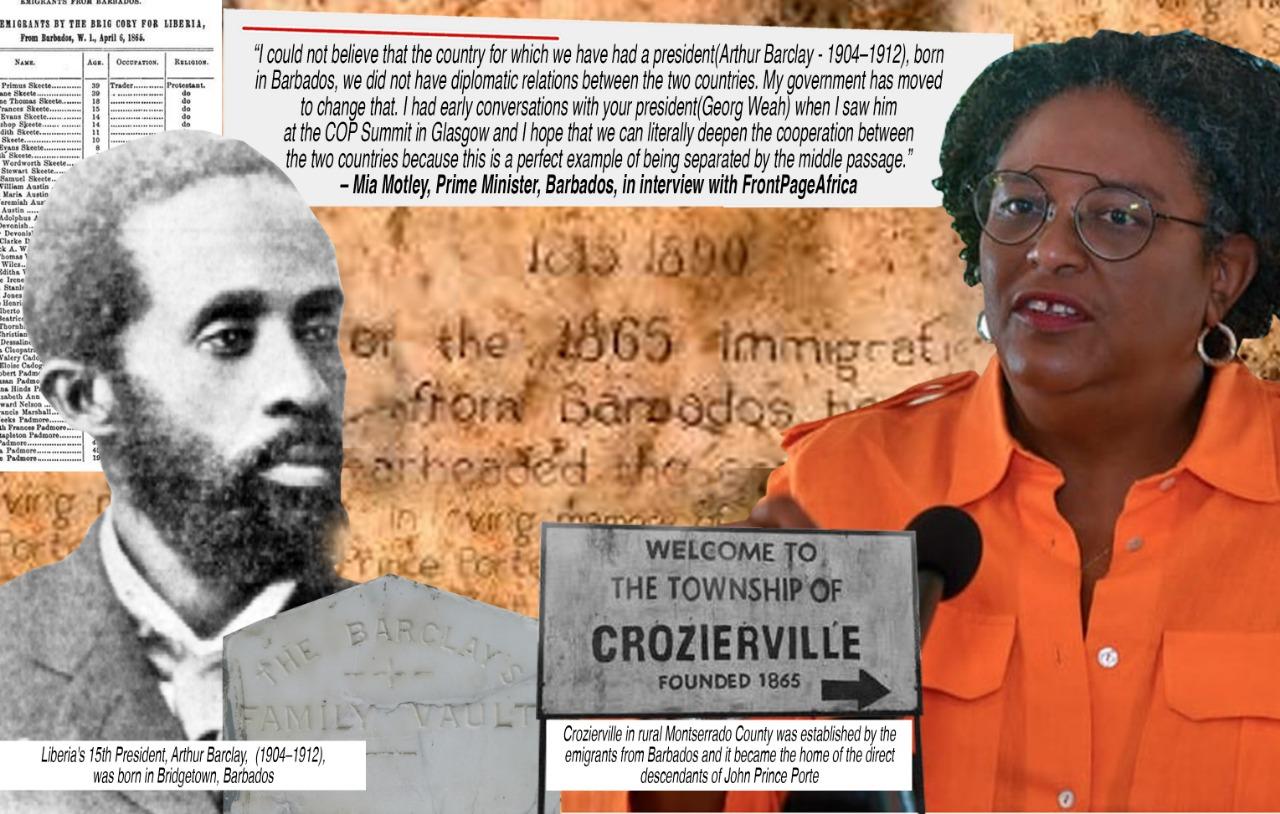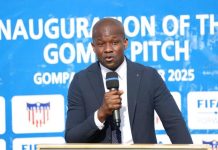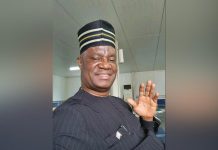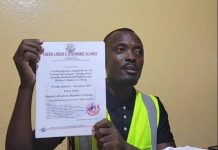Africa-Press – Liberia. BRIDGETOWN, Barbados –
The Presidency of Arthur Barclay who led Liberia from 1904 to 1912 is often credited with bringing an end to the conflict between mulattoes and black emigrants. It was under Barclay’s reign that the Liberian Constitution was changed giving citizenship to the people of tribal origin, and a system of ‘indirect rule’ introduced.
Born in Bridgetown, Barbados, on July 31, 1854, the tenth of twelve children of Anthony and Sarah Barclay, Arthur Barclay was the father of Anthony Barclay, who served on the Supreme Court of Liberia, during the reign of his uncle Edwin Barclay, Liberia’s 18th president.
Ironically, despite being born in Barbados and his immense contribution to Liberia’s political and economic history, there is no diplomatic ties between Barbados and Liberia, a glitch, the current Prime Minister of Barbados, Mia Motley is looking to troubleshoot.
Motley ‘Could Not Believe it’
In an exclusive interview with FrontPageAfrica, PM Motley expressed shock about the glitch. “I could not believe that the country for which we have had a president (Arthur Barclay – 1904–1912), born in Barbados, we did not have diplomatic relations between the two countries. My government has moved to change that. I had early conversations with your president(Georg Weah) when I saw him at the COP Summit in Glasgow and I hope that we can literally deepen the cooperation between the two countries because this is a perfect example of being separated by the middle passage.”
That middle passage was a talking point for Motley when she addressed the historic and inaugural CARICOM-Africa virtual Summit and hosted by Kenya under the theme, “Unity Across Continents and Oceans: Opportunities for Deepening Integration.”
Chaired by Kenyan President Uhuru Kenyatta in September, the summit had to be put on hold because of the COVID-19 pandemic. It followed on the declaration by the African Union of the Diaspora as the sixth region of Africa.
Since the summit, Motley says, work has been done to address the concerns raised. “We’re working on the ground I mean, things as is said don’t happen all at once -and remember we’re working in the middle of a pandemic and we’re working in the middle of other challenges we all face but we’ve made significant progress and it was in August 2019 in this same building that we are that President Kenyatta and myself spoke to the fact that we would want to have a Caricom AU summit, we had hoped that it would happen in June 2020 on our way to the Commonwealth heads of government meeting, we would have had the summit in Nairobi, clearly it had to be put off.”
Pushing for Direct Flights from Africa to Caribbean
For Motley, a burning issue has been the push for weekly direct flights between Africa and the Caribbean, a joint public-private sector mechanism, a shared mass media platform to exchange news, information and culture, and a collective approach to the United Nations Conference against racism.
The Prime Minister told FPA that it was so important to make the push. “I said and I repeat now that we need to remove the middle passage, the middle man, the middle leg, in our relationship between the Carribean and Africa – and that is exactly what we are trying to do. So, my officials in the Ministry of tourism are working with others in Kenya and in Ghana to see how we can open up the continent for the first time in terms of air travel. I think we all agree that there is a market on both sides who are willing to learn more, to participate more. We want to know more of our heritage and persons in Africa want to be able to see what became of their families in this part of the world and at the same time enjoy what we sent to the world which is some of the best locations to be able to enjoy and relax and to reflect and to work from. So, I look forward to that.”
The PM says her government has in recent months opened an embassy in Ghana and in Kenya and pointed to ongoing discussions in the backdrop of the CARICOM summit as a key reason why relationship between Africa and the Caribbean should be fostered. “The stories that are less known is that we came back to Africa – and we came back to Liberia and we came to Sierra Leone and those stories are now being told. I keep saying that there was actually a Bajan person who was a Barbadian born, who was a President of a nation of the world before Dame Sandra Prunella Mason, and that was in Liberia – at the turn of the century.”
Last week, Barbados swore in its first-ever president, replacing Queen Elizabeth II with Sandra Mason as its head of state. Mason, a 72-year-old black judge was elected in October after the country moved to sever ties with the British monarchy last year. She had been previously serving as Barbados’s governor-general, technically a representative of the queen.
For Motley, the change was long overdue. “We’ve been charting our own destiny for the past 55 years but what this does is allows us to do it without having a hereditary head of state who has no relationship from the point of view that they are not of here. We’re very clear that this moment was necessary because every Barbadian boy or girl should be able to aspire to be the head of state of their own nation. But apart of anything else, it speaks to the equality of opportunity because if you are only capable of having a head of state who passes it on to their heir and successor then you are literally being told you’re not good enough to hold that – and that statement of not being good enough is fundamentally what this exercise is all about – that we reject and repudiate all of those intangible things that we inherited as a colony that basically said back was wrong, black was bad, that we’re not good enough to be the best to hold the position as head of state – all of those things go to undermine our confluences of history.”
Historic Tie Links Liberia, Barbados
Motley laments that the story of Barclay’s sojourn in Liberia is one of many lost in the wind. “Barclay, who was born in Barbados, came to Liberia as a teenager. So, these are the stories that we need to tell our people. People don’t know about the story as to the Bajans who left post 1816 Bussa rebellion – and when the British government said that they didn’t want them here anymore and when they were tired hanging people, they sent them to Honduras and Honduras said they didn’t want them and they sent them to Sierra Leone. So, we have to tell the stories.”
Liberia and Barbados share a distinct tie – dating as far back as 1862 when the Liberian Parliament extended an invitation to persons of African descent from the islands of the West Indies to come and settle in Liberia. A follow-up invitation was sent in 1864 and in 1865, hundreds of Baijans emigrated to Liberia. Among them was John Prince Porte and his family.
On the ship were doctors, lawyers, carpenters, masoners and a host of others not just looking for a new home but a new adventure. The invitation led to a total of 346 emigrants from Barbados, sailing to Liberia on April 6, 1865, following the signing of the Treaty between the two countries.
In January 2020, Prime Minister Mia Mottley designated and introduced 2020 as the year for Barbadians and those who love Barbados to come home and reconnect with family and friends and to invest in rebuilding and development of Barbados. Under the theme “We Gatherin 2020”, the program was a clarion homecoming invitation symbolizing a recommitment to the core Barbadian values.
A collaborative project, the brainchild of Ambassador Lorenzo Witherspoon, great-great grandson of John Prince Porte, has set the pace for much of what will serve as the basis of the emigration project
The project paper, “Portes Find a New Home in Liberia documents the a Story of the Post-emancipation Emigration of the John Prince Porte Family from Barbados, West Indies, to Liberia, West Africa, in 1865 & The Family’s Quest for Ancestral Citizenship.
This is complimented by the Passenger Manifest of the Brig CORA, the vessel that brought the emigrants from Barbados to Liberia on April 6, 1865. It includes A History of Crozierville, the first-ever Porte Family Tree, a Porte Family Photo Gallery, and two separate documents portraying the Prominent Roles played in Liberia and internationally by Direct Descendants of John Prince Porte and Prominent Positions held in Liberia and internationally by other 1865 emigrant families from Barbados and their descendants who settled in Crozierville.
Last November, Barbados Prime hosted Witherspoon and embraced the Barbados-Liberia connection with nostalgia and discussion of the extensive social and economic potential that could be tapped into with gr//eater cooperation. The story of Barclay and his role in Liberia’s early rise remains a crucial part of the history of Africa’s oldest republic.
Barclay is also remembered for opening up Liberia for foreigners and foreign capital by granting concession agreements and attracting international loans. However, according to historian Fred Van Der Kraaij, Barclay was not able to prevent several serious tribal uprisings since the Ports Entry Law of 1864 remained in force. In 1910 he added new reasons for the tribal people to rebel by introducing unpopular taxes, notably the Hut Tax.
In his First Inaugural Address to the Legislature, President Arthur Barclay attacked the ‘closed door’ policy of his predecessors and notably the Ports of Entry Law of 1864: “(…) Liberia was purchased for us from its native inhabitants by the Europeans (Barclay referred to the American Colonization Society and he included white Americans in this group as well – note of the author, FVDK). The colony was founded by the European. Its expenses paid by the money of the European, until it declared its independence. They lavished their money on the establishment of schools, churches and other agencies for the elevation of successive bodies of Negro colonists. (…) It was a European, too, who made possible, the annexation of the State of Maryland in Liberia to the Republic (…) (but) By Organic Law we shut him out from citizenship, and denied him the right of holding real estate in gee simple. (…)
In 1877, Barclay was called to the bar of Montserrado County and after practicing law for three years, he attained the rank of counsellor of the Supreme Court. His first official position was private secretary to President Joseph Jenkins Roberts in 1874. His second position was judge of the Court of Quarter Sessions and Common Pleas of Montserrado County to which he was appointed by President Alfred F. Russel in 1883 and in 1885, President Hilary R.W. Johnson appointed him sub-treasurer of Montserrado County, which he held for 5 years.
He was mayor of Monrovia from 1892 to 1902 and in 1892, President Joseph James Cheesman elevated him to the cabinet position as postmaster-general and then to secretary of state. Upon the death of his predecessor H. A. Williams in 1896, Barclay was appointed secretary of the treasury, which he held until his election to the presidency in May 1903. Inaugurated in January 1904, he served until January 1912. After his retirement served as president of Liberia College from 1914 to 1917. President Barclay died at his home in Monrovia on July 10, 1938, and is interred at the Palm Grove Cemetery.
For More News And Analysis About Liberia Follow Africa-Press






